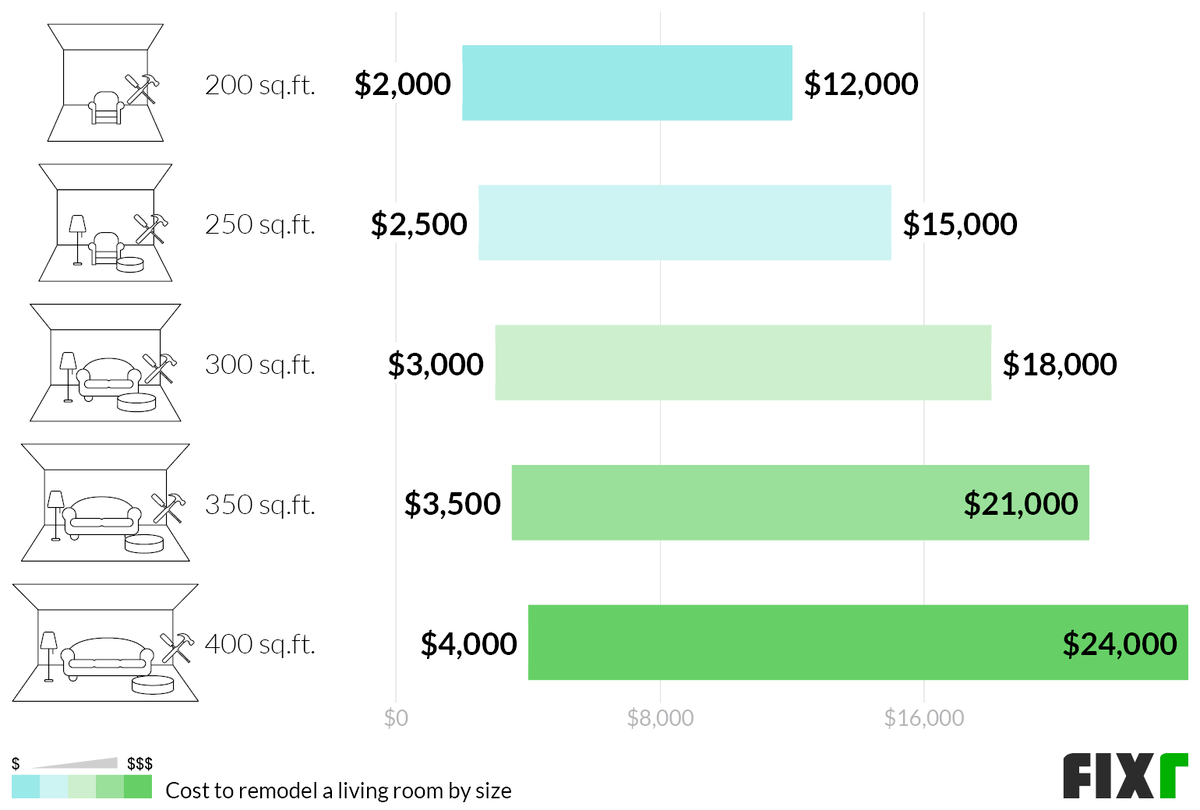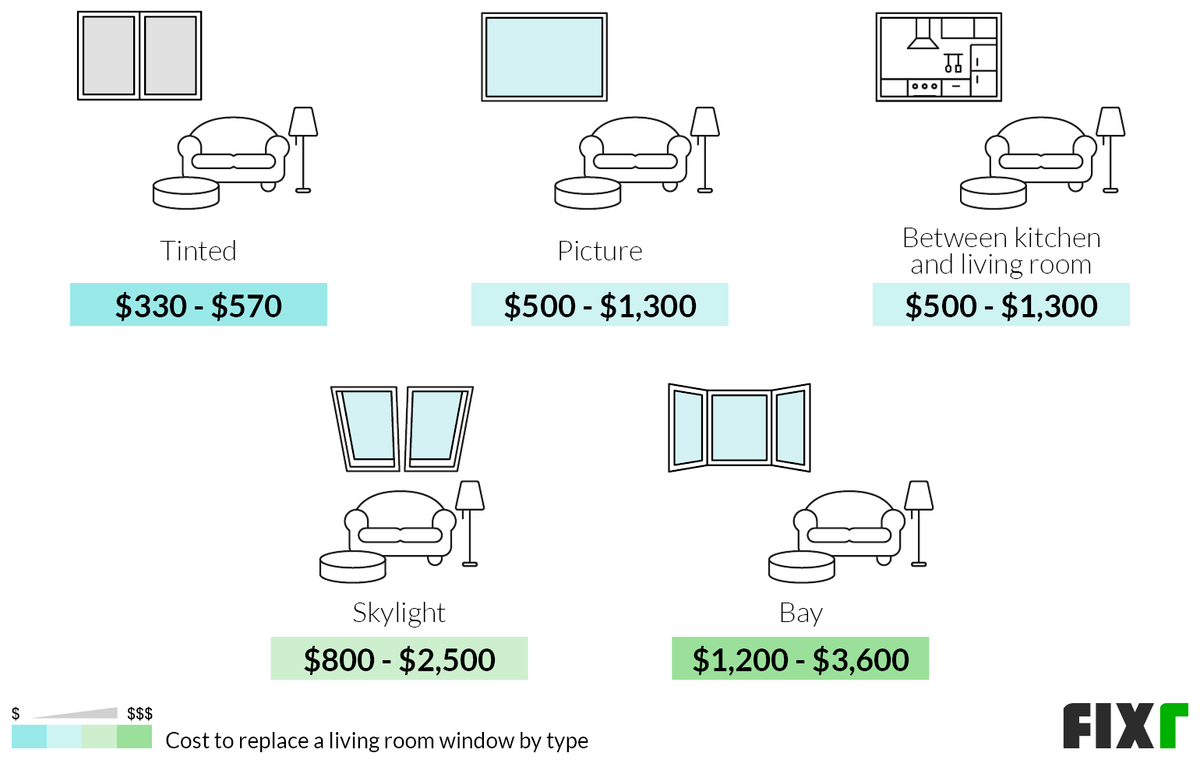How Much Does It Cost to Remodel a Living Room?
The living room is one of the most frequently used spaces in the home. It is where people gather to entertain, relax, and converse. In some cases, it is also where children play and study and adults work. And whether you have a formal living room or it is the main attraction in the home, it helps if it looks and functions at its best.
A living room remodel makes the most of the space. They can transform the space, whether it needs a facelift or you want to add shelves or an entertainment center to improve storage and function.
The national average cost range for remodeling a living room is $2,500 to $15,000. Most homeowners spend an average of $8,000 on remodeling a 250 sq.ft. living room with hardwood floors, paint, lighting, and removal of one wall. This project’s low cost is $1,500 for painting the walls and refinishing an existing floor. The high cost is $20,000 for a full remodel of a 250 sq.ft. room with new flooring, lights, built-in storage and entertainment center, windows and window treatments, and paint.
Cost to Remodel Living Room
| Living Room Renovation Cost | |
|---|---|
| National average cost | $8,000 |
| Average range | $2,500-$15,000 |
| Low-end | $1,500 |
| High-end | $20,000 |
In this guide
Cost to Renovate a Living Room by Project
Remodel Living Room Walls Cost
Living Room Storage Cost
Living Room Lighting Cost
Living Room Window Treatments
Living Room Furniture Cost
Living Room Electronics Cost
Cost to Remodel a Living Room Ceiling
Living Room Window Replacement Cost
Living Room Door Replacement Cost
Living Room Floor Cost
Labor Costs to Remodel a Living Room
Living Room Add-Ons
Living Room Expansion Cost
Open Concept Living Room, Dining Room, and Kitchen
Enhancement and Improvement Costs
Additional Considerations
FAQs
Living Room Remodeling Cost by Project Range
Cost to Remodel a Living Room by Size
The size of the space you renovate directly impacts the cost. You can renovate a living room in several ways with a range of costs, most falling between $10 and $60 a sq.ft., with high-end remodels falling above this range. The more materials used and the larger the space, the more labor that must go into it. Average living rooms typically range in size between 250 and 400 sq.ft. and have a range of associated costs, depending on what you do. Below are the average costs to renovate living rooms based on size. However, there is a wide range of options you can add, which may create costs outside these ranges.

| Living Room Size | Average Remodel Cost (Labor Included) |
|---|---|
| 200 sq.ft. | $2,000 - $12,000 |
| 250 sq.ft. | $2,500 - $15,000 |
| 300 sq.ft. | $3,000 - $18,000 |
| 350 sq.ft. | $3,500 - $21,000 |
| 400 sq.ft. | $4,000 - $24,000 |
Small Living Room Remodel
A small living room is considered to be up to 130 sq.ft. Assuming the same cost ranges per square foot apply, the cost to remodel a small living room is between $1,300 and $7,800. Small living rooms are less likely to have built-ins and other add-ons because they do not have the space. This often means they do not usually go outside of this range at the high end like a larger room might with large entertainment centers or fireplaces.
Cost to Renovate a Living Room by Project
Many projects can go into a living room remodel. You may choose to do one or all of them for the ideal space. The costs are broken down, from least to most expensive, for an idea of what a full-scale remodel may entail.

| Project | Average Cost (Installed) |
|---|---|
| Walls | $1.75 - $60/sq.ft. |
| Storage | $20 - $15,000 |
| Lighting | $25 - $2,000 |
| Window Treatment | $50 - $1,000 |
| Furniture | $100 - $5,000 |
| Electronics | $200 - $5,000 |
| Ceiling | $250 - $12,000 |
| Windows | $330 - $3,600 |
| Doors | $450 - $4,000 |
| Flooring | $500 - $14,750 |
Remodel Living Room Walls Cost
In most situations, your new living room likely has drywall for the main wall covering. However, this is not always the case. In some designs, you may want to include an accent wall of a different material. Or, your room may already have walls of a different material that you want to match. Below is the average cost per square foot for different wall options.

| Wall Type | Average Cost per Sq.Ft. (Installed) |
|---|---|
| Insulation | $1.75 - $7.50 |
| Paint | $2 - $6 |
| Wallpaper | $3.70 - $8.20 |
| Tile | $7 - $50 |
| Wainscoting | $10 - $15 |
| Wood | $10 - $30 |
| Brick | $14 - $20 |
| Concrete | $30 - $60 |
Cost to Insulate Living Room Walls
The cost to insulate living room walls averages $1.75 to $7.50 a sq.ft. If you are insulating existing walls, you have two options. One is blown-in insulation, which uses damp cellulose blown into the walls from the outside. The other is spray foam insulation, which is more costly and invasive. Spray foam may require cutting into your drywall and could necessitate additional repair. Both make your room more comfortable and energy-efficient.
Paint a Living Room Wall
The average cost to paint a living room wall is $2 to $6 a sq.ft. These costs assume you use two coats of paint. If you are going from a very dark color to a much lighter color or a very light color to a much darker or brighter color, you may also need a primer 1. Painting even one wall in your living room can give the space a new look and feel. Keep in mind that warm bold colors make the wall appear closer if you are considering an accent wall. Cool light colors make it appear farther away, visually increasing the room size.
Wallpaper for a Living Room
The cost to wallpaper your living room ranges from $3.70 to $8.20 a sq.ft. Wallpaper comes in a wide range of colors, patterns, and materials. You can also use it to cover a single wall or paper every wall. Use it as a border or above wainscoting or from floor to ceiling. Many wallpapers today are much easier to care for and wash than older types. However, most realtors recommend removing wallpaper when selling your home.
Tile Wall in a Living Room
The cost to tile a wall in your living room is $7 to $50 a sq.ft. Tile can make a very attractive accent wall for any area of the room. Tile comes in many materials, shapes, sizes, colors, and styles. You can use patterned tiles that interlock to form unique geometric designs. You can also use stone tiles to create a rustic appearance or polished stone for a more elegant look. You can even use glass or stone mosaic tiles for a “tile wallpaper” look to give your wall a one-of-a-kind appearance.
Wainscoting Living Room Walls
The cost of wainscoting for living room walls averages $10 to $15 a sq.ft. Wainscoting is a decorative material like wood that is installed to about chair rail height on the walls. Above the wainscot may be painted or wallpapered to complete the room. You can choose many types of wainscoting, from beadboard to panels. There are also several materials. Wood is the most popular, but newer fiberglass and vinyl materials are easier to care for long term.
Wood Wall in a Living Room
The cost to create a wood wall in the living room ranges from $10 to $30 a sq.ft. You can create a wood accent wall in many ways. You can use beadboard from floor to ceiling for a cottage appearance. You can also use barn wood or reclaimed wood to create a rustic appearance for the room. You can also use a more polished wood panel, such as an extended wainscot to shoulder or eye level. A good tip for creating a wood wall is to use it as the main area’s backdrop. For example, if you mount a TV or shelves on a specific wall and arrange furniture to face it, this is the wall to create the accent on.
Brick Wall in a Living Room
The cost of creating a brick wall in a living room is $14 to $20 a sq.ft. Brick veneer 2 can be applied to any interior wall in your home. The bricks are installed over the wall’s surface rather than building the wall out of them. Depending on the type, you may install them like tile or a more traditional setting with mortar 3. Interior bricks come in several sizes, colors, and styles. You can also find worn bricks or reclaimed bricks for this project for a more rustic look.
Concrete Wall in a Living Room
The cost to create a concrete wall in a living room averages $30 to $60 a sq.ft. Adding a concrete wall to an existing room is a difficult and expensive job. It can be done in several ways. If you have access, a mold can be erected in the room, and the concrete poured in for a cast-in-place wall. You can also have the wall cast elsewhere and brought in for installation. An easier method is to create a wall using concrete blocks. While this does not give as smooth an appearance, you can create curved walls and other styles that a poured wall may not do in an existing space.
Living Room Storage Cost
You can install some storage in the area to keep your living room from becoming cluttered. This can be as simple as floating shelves or as complex as built-in cabinetry and an entertainment center. Storage should be designed for your space for the best look and function. Ideally, you want the storage to work for the needs you have already.

| Storage | Average Costs (Installed) |
|---|---|
| Floating Shelves | $20 - $80 |
| Cabinetry | $200 - $3,000 |
| Built-In Shelves | $1,500 - $4,000 |
| Built-In Entertainment Center | $3,000 - $15,000 |
Floating Shelves for a Living Room
The cost of floating shelves for the living room is roughly $20 to $80 apiece. Floating shelves can make great additions to the room. They are quick and easy to install and use minimal hardware for a clean, uncluttered appearance. They come in several sizes and materials. This means you can hang one or several, depending on your needs. Keep in mind that floating shelves have weight limits lower than other types. This can mean there may be limits on what you can store.
Living Room Storage Cabinet
The cost of a living room storage cabinet averages $200 to $3,000. There are many types of storage cabinets. Some are simple wall-hung cabinets you can hang on the side of a TV or fireplace. Others may be more elaborate cabinet sets that include several cabinets and shelves. These cabinets are generally designed to hold a range of items. You can use them to hold books, electronics, and other frequently used items. They come in several colors, materials, and styles to match the rest of the space.
Built-In Shelves for a Living Room
The cost to have shelves built for the living room ranges from $1,500 to $4,000. Built-in 4 shelves allow you to make the most of your space. They can be custom-fit to your exact dimensions, and many can be fit into the walls to save space. Built-in shelves are ideal for people with extensive book collections and other items they wish to display. The shelves can be designed in several sizes and materials. This can allow you to create a setup that coordinates easily with the rest of the space.
Living Room Built-In Entertainment Center
The cost of a built-in entertainment center for the living room is $3,000 to $15,000. Built-in entertainment centers are designed to meet your storage needs. They can hold your TV and electronics, books, media, and artwork. They are designed to fit the dimensions of your space, so you can be assured of a perfect fit. Entertainment centers can be designed in several styles. They can also be made from many materials to coordinate with the rest of your space.
Living Room Lighting Cost
Layered lighting is the best way to illuminate your living room. Light is crucial to the space’s function and appearance. Every living room should have three distinct lighting types - ambient or general lighting, accent lighting, and task lighting.
Ambient lighting is most commonly recessed lighting because it provides the most even light overall. Accent lighting is the decorative lights you include in the design, such as lamps, pendants, and chandeliers. Task lighting like a desk lamp, lights focused on shelves, or lighting around an entertainment center helps you use the room.

| Lighting | Average Costs (Installed) |
|---|---|
| Table | $25 - $400 |
| Floor Lamps | $50 - $500 |
| Pendant | $200 - $450 |
| Wall Sconce | $200 - $450 |
| Chandelier | $200 - $2,000 |
| Recessed Lighting | $800 - $2,000 |
Table Lamps for a Living Room
The cost of a table lamp for the living room ranges from $25 to $400. Table lamps make great task and accent lighting for the room. They can be positioned on end tables beside areas where people sit and read. They can also be used as lamps on desks or study areas. Table lamps come in several sizes and brightness levels, depending on your needs. They can reduce energy usage by providing light where you want it rather than illuminating the entire room.
Floor Lamps for a Living Room
The cost of a floor lamp averages $50 to $500. Floor lamps provide many of the same uses as table lamps. They can be accent or task lighting and may also aid in ambient lighting. Floor lamps have several lights branching off them or a single light. Branchable lights may be positionable to add in tasks, such as reading, and many floor lamps may have different levels of lighting. This can let you add some dim lighting while watching TV or help you illuminate the entire room for a party.
Pendant Lights for a Living Room
Pendant lights cost between $200 and $450 installed. Pendant lights are suspended from the ceiling, hanging down, usually over a table or other focal point. They provide ambient and accent lighting. Pendants come in many shapes, sizes, and styles. They call your attention to a specific area or add light where needed. They work best in rooms with high ceilings, where you may want to bring the lights down toward the user.
Wall Sconces for a Living Room
The cost of wall sconces cost between $200 and $450 installed. Wall sconces or wall lighting provide the room with accent lighting. They can sometimes add support to other ambient light sources. Wall sconces are frequently installed near doorways, but they can also be used on the sides of bookcases or wall art. There are several wall sconce styles to choose from. Some have a farmhouse style, while others may be more modern.
Chandelier for a Living Room
The cost of adding a chandelier is $200 to $2,000. Chandeliers can make beautiful statements in the living room. A chandelier is a large light fixture hanging from the ceiling. It is designed to provide ambient and accent lighting. They can be extremely elaborate and decorative or simple. Chandeliers look best in rooms with taller ceilings. They can make a nice focal point for the room when centered or draw the eye to other areas.
Recessed Lighting for a Living Room
The cost of adding recessed lighting 5 averages $800 to $2,000. Recessed lights sit flush with your ceiling. They provide ambient light for the room as a whole, but some are designed for accent lighting. Recessed lights are installed above the ceiling so that the edge of the can sits flush, and the light is somewhat above the room. They are sleek and modern in design and can provide even lighting throughout a space. They work well in ceilings of all heights and angles.
Living Room Window Treatments
Windows may be integral to the room, but the window treatments make them part of the design. Window treatments give the space form and function. Curtains, blinds, and shades block the sun from entering while providing privacy at night. Screens keep insects out when the windows are open. Most window treatments have decorative elements and colors to coordinate with the room. Installing the following window treatments can dramatically improve a window’s appearance and function.

| Type of Window Treatment | Average Cost (Installed) |
|---|---|
| Curtains | $50 - $500 |
| Screens | $70 - $200 |
| Blinds | $400 - $1,000 |
| Shades | $600 - $1,000 |
Living Room Furniture Cost
Many people renovating or remodeling a living room also invest in new furniture. This can be because renovating the room can change its size, shape, and style, which can influence the furnishings used.
Furniture for the living room needs to achieve a few goals. It must be large enough to fill the space without crowding it. It also needs to work with the way you intend to use the space. For example, chairs beside a window create a conversation area, while a large couch with a coffee table may face an entertainment center.
When planning the space, walk through the room from different locations. This path should remain empty to avoid making the area feel awkward.
The furniture items can match or not, depending on the room’s style. While many prefer new furnishings after a renovation, doing so increases cost enormously. Many people want to reuse existing furniture and decorate it separately later to manage expenses.

| Furniture | Average Costs (Installed) |
|---|---|
| Table Replacement | $100 - $5,000 |
| Armchair | $200 - $1,500 |
| Love Seat | $400 - $1,500 |
| Recliner | $500 - $3,000 |
| Couch Replacement | $500 - $5,000 |
| Couch Upholstery | $750 - $3,500 |
Replace a Living Room Table
The cost of a new living room table ranges from $100 to $5,000. Many types of tables work in the living room. Most spaces have a combination of at least two or three. End tables are ideal for placing at either end of a sofa or beside a single armchair. Coffee tables are designed to be placed in the center of a seating area, while sofa tables are placed behind a sofa in a room where the furniture is arranged in the center. Desks are also a helpful addition because it gives people a place to work from home in lieu of a home office.

| Type of Table | Average Costs (Installed) |
|---|---|
| End Table | $100 - $1,000 |
| Coffee Table | $500 - $2,000 |
| Sofa Table | $500 - $2,000 |
| Desk | $500 - $5,000 |
Armchair for a Living Room
The average cost of an armchair is $200 to $1,500. Armchairs make great additions to living rooms and can be used in several ways. You can create a conversation area by arranging two armchairs facing one another. This can be beside a fireplace or tucked in a cozy corner. You can also add one or two armchairs at either end of a sofa. This can facilitate better conversation and help add more seating for a party.
Living Room Loveseat
The average cost of a loveseat ranges from $400 to $1,500. Loveseats can be used in place of couches in smaller rooms and spaces. They can also add additional seating alongside a larger couch. Loveseats are generally designed for two people, so they can be a more intimate arrangement than couches and armchairs. You can arrange two loveseats to face one another to create a conversation area similar to how you would with armchairs. You can also arrange one loveseat at either end of a sofa to increase the amount of seating.
Recliner for a Living Room
The cost of a recliner averages $500 to $3,000. Recliners make more comfortable additions to a space than an ordinary armchair. Recliners can have several options for use. Some are stationary when not reclined, while others rock. The recliner may be a single chair, loveseat, or small couch or sofa. It is common for these seats to also have things like cup holders, USB ports, and even fold-down tables.
Couch for a Living Room
The average cost of a couch for the living room is $500 to $5,000. Couches are one of the most common pieces of furniture added to the living room. They come in many shapes, sizes, and configurations. They can be a single piece of furniture or a sectional that you can arrange to fit your needs. Many couches can come suited with other furniture pieces, meaning you can get a couch and armchair or loveseat that coordinate for a cohesive look.
Living Room Couch Upholstery
The average cost to reupholster an existing couch ranges from $750 to $3,500. If you have a couch that is in good condition but looks outdated or worn, reupholstering can be a good idea. This process changes the couch’s surface and appearance but not the overall structure. Depending on the piece, it can be cheaper than purchasing a new one. It is also frequently more environmentally friendly to reupholster than throwing out an old couch and purchasing a new one. Reupholstering during a remodel can help your old couch match its new surroundings with style.
Living Room Electronics Cost
For some people, the living room is considered a formal space for entertaining and does not contain electronics or gaming systems. For others, it is a family gathering place and may include entertainment systems. When planning and laying out the room, include ample outlets and jacks for the systems you plan to use and consider the arrangement of the furniture for their use.

| Type of Electronic | Average Costs (Installed) |
|---|---|
| Projector | $200 - $2,000 |
| Sound System | $500 - $5,000 |
| TV | $1,000 - $2,000 |
Cost to Remodel a Living Room Ceiling
When moving walls or having extensive work done in the living room, you likely also need to have work done on the ceiling. Drywall is the most common material used on the ceiling, but that does not have to be the case.
Coffered ceilings are popular in formal rooms. Decorative ceilings with tin or pressed tiles, ceiling beams, painted patterns, decorative textures, and mosaics are also popular.
In many cases, the type of ceiling should be in line with the home’s style. For example, a cottage-style house may have a beadboard ceiling, while a Victorian has a coffered ceiling.
Keep in mind that if you have an open floor plan, your ceiling needs to match those outside of the living room area for the best results.

| Ceiling Project | Average Costs (Labor Included) |
|---|---|
| Ceiling Repair | $250 - $850 |
| Add Crown Molding | $500 - $1,200 |
| Popcorn Ceiling Makeover | $500 - $1,500 |
| Add Tray Ceiling | $500 - $2,000 |
| Drywall Ceiling Replacement | $1,250 - $1,500 |
| Drop Ceiling to Drywall | $1,250 - $1,500 |
| Add Beadboard Ceiling | $1,250 - $1,500 |
| Add Coffered Ceiling | $3,500 - $7,500 |
| Add Vaulted Ceiling | $8,000 - $12,000 |
Living Room Ceiling Repair Cost
The cost to repair a ceiling in the living room is $250 to $850. Ceilings do not get much wear, but they can develop problems over time. If you had a leak above the ceiling, it may sag or develop moisture problems. It may also crack from the house settling, and you may have a section of ceiling to repair if you remove a wall. Ceiling repairs are generally easy and do not take much time. At the most invasive, it may mean replacing a small section of drywall.
Cost to Install Crown Molding in a Living Room
The cost to install crown molding 6 averages $500 to $1,200. Installing crown molding can give it a more interesting and finished appearance. Crown molding is the large molding installed where the ceiling meets the top of the wall. It typically runs around the room’s perimeter. Crown molding comes in several styles and materials. Depending on the material, it may need to be painted or stained before or just after installation, increasing costs.
Popcorn Ceiling Makeover
The cost of a popcorn ceiling 7 makeover ranges from $500 to $1,500. Popcorn ceiling is an older textured ceiling style popular around 30 years ago. It may contain asbestos in some older homes and has generally fallen out of favor in appearance. The most common method of giving a popcorn ceiling a makeover is to remove the texture. Ensure the material is tested for asbestos before removing it. Popcorn ceilings may contain between 1% and 10% asbestos, so testing before removal is important to ensure you do not accidentally release fibers into the air.
Living Room Tray Ceiling
The cost to install a tray ceiling in a living room is $500 to $2,000. Tray ceilings add a sense of depth and the illusion of more height to the room. A tray ceiling consists of two parts. The first is the center of the ceiling, which is the highest part. The second is the platform molding installed around the perimeter. Tray ceilings are a good addition to rooms with overly high ceilings because it brings them down in scale and makes the room look cozier.
Cost to Replace a Drywall Ceiling
The average cost to replace a drywall 8 ceiling ranges from $1,250 to $1,500. Drywall is one of the most common materials for creating a ceiling. It can last for years but may eventually develop issues from settling or moisture. If you had a leak above the ceiling, there is a good chance the drywall must be replaced. Replacing a drywall ceiling is fairly fast and easy, but the tearout can be dusty. For this reason, it is often recommended you remove most belongings from the room before the work begins.
Cost to Replace a Drop Ceiling with Drywall
The cost to replace a drop ceiling with drywall averages $1,250 to $1,500. Not all drop ceilings can be easily replaced with drywall. Often, a drop ceiling is created to hide things like utilities while still allowing access to them. To replace it with drywall, you need to ensure the utilities do not need access in this area. In addition, you need to make sure the utilities do not extend down past the studs that the drywall is attaching to. If these conditions are met, replacing a drop ceiling with drywall is a fast and easy project.
Living Room Beadboard Ceiling
The cost to install a beadboard ceiling in the living room is $1,250 to $1,500. Beadboard ceilings give a room a cottage look and style. The beadboard look can be achieved with many material types to cover the ceiling. The most common is a type of thin board with beadboard grooves. This board can be attached to your existing drywall. You can also choose to remove the drywall and install a slightly thicker board to create the look.
Living Room Coffered Ceiling
The cost of a coffered ceiling in the living room averages $3,500 to $7,500. The word coffered comes from the French word for box, which is how the ceiling gets its name. The coffers used in older ceilings were essentially wood boxes installed in a pattern on the ceiling. Today, you can use a number of materials to create a coffered ceiling, including solid wood or faux-wood beams and fiberglass 9 and vinyl coffers. Costs vary depending on the ceiling height and material.
Living Room Vaulted Ceiling
The cost to create a vaulted 10 ceiling in an existing living room ranges from $8,000 to $12,000. A vaulted ceiling can only be created in your existing home under precise circumstances. You cannot have a second floor or story above the living room. You also cannot have any currently in-use attic space above the living room. Vaulting removes the current ceiling and anything else above it up to the roof deck. Then, the roof deck and the rest of the new ceiling are finished. This is a difficult job and is most often completed when the home is being built rather than attempting to retrofit.
Living Room Window Replacement Cost
Windows and natural lighting are crucial to any space. If your windows are old, leaky, or drafty, consider updating them. Doing so can make your room more comfortable, energy-efficient, and attractive. Depending on your living room size, you may have a single large window or several smaller ones. The costs below are per window for an idea of their replacement as part of the project.

| Type of Window | Average Cost (Installed) |
|---|---|
| Tinted | $330 - $570 |
| Picture | $500 - $1,300 |
| Window Between a Kitchen and Living Room | $500 - $1,300 |
| Skylight | $800 - $2,500 |
| Bay | $1,200 - $3,600 |
Tinted Living Room Windows
The average cost to tint your living room windows is $330 to $570 for 5 windows. Your costs could be different if your room has fewer windows. Tinting your windows has several benefits. It helps insulate your home from the sun’s rays. This helps your home stay cooler in the summer and stops fading of rugs and furnishings. Tinting can also offer privacy and reduce glare.
Picture Windows for a Living Room
The cost of a picture window 11 is $500 to $1,300. Picture windows are large stationary windows. They do not open or move. They are usually one large pane of glass, meaning they frame the view outside as a picture. Picture windows are a great way to maximize the amount of light in a space. They can also be a great addition to living rooms that look out over a view like the ocean or a forest.
Window Between a Kitchen and Living Room
The cost of a window between your kitchen and living room ranges from $500 to $1,300. You can create a window in this space with several methods. Some are merely creating an opening in the wall and framing it, so the window is a way to converse between the two rooms. Other times, you may want to install a pane of glass, allowing people to see through to the room beyond but limiting conversation and noise. These costs are for creating a new opening or replacing an existing glass pane. Costs are similar for both, assuming the window size is similar.
Living Room Skylights
Skylights cost $800 to $2,500. A skylight is a great way to add additional light. They work particularly well in vaulted or cathedral ceilings because the ceiling naturally extends to the roofline 12. They can be installed in attic spaces by extending a short “wall” down on either side of the skylight to the ceiling. This creates a small tunnel adding depth and interest to the room along with light. Skylights allow a lot of light in, which can heat the space below, particularly in the summer months.
Living Room with a Bay Window
The cost of a bay window 13 averages $1,200 to $3,600. Bay windows make beautiful additions to many spaces. This is essentially a window made up of a few parts, so it forms an arch. Many bay windows extend outwards, creating the opportunity for a small ledge, shelf, or window seat on the interior below the window. This creates a focal point and has various other uses, including storage and a conversation area. Bay windows can be designed in many sizes, with or without a window seat, to fit many areas.
Living Room Door Replacement Cost
Not all living rooms have doors in their doorways, but those that do can have many options and styles. Living rooms may exit directly to the outdoors, allowing you to have sliding or French doors to a patio. You may also have interior doors that close the living room off from the rest of the home for privacy or parties. It is common to replace existing doors within the living room during major renovations to ensure the new design is cohesive.

| Type of Door | Average Replacement Cost (Installed) |
|---|---|
| Barn | $450 - $750 |
| $600 - $1,500 | |
| French | $1,000 - $4,000 |
| Sliding | $2,000 - $4,000 |
Living Room Barn Door
The cost of a barn door is $450 to $750. Barn doors make great additions to many spaces. They can cover small or large doorways and can be made of several materials. The doors slide along a track, covering a portion of the wall they are installed on when open. However, they do not take up space inside the room from the door swing, making them an accessible option. Barn doors can also be a focal point or add rustic charm to the room.
Pocket Door for a Living Room
The cost of a pocket door replacement for the living room averages $600 to $1,500. Pocket doors have many of the same benefits as barn doors when it comes to space-saving and accessibility. However, unlike barn doors that slide over the wall, pocket doors slide into the wall. This means they do not obstruct light switches or outlets and allow artwork to be hung on the wall. Pocket door installations can be difficult. This is because the track is installed inside the wall. As long as the existing track is in good condition, replacements can usually be done without much trouble.
Living Room French Doors
The cost of French doors for the living room ranges from $1,000 to $4,000. French doors are typically made of glass panels. The most common installation is two doors, which both swing out from a center connection. However, you can have sliding French doors or single French doors with or without a side panel. French doors may be installed on an exterior wall to lead to a patio. They may also be installed indoors, leading to a dining room, kitchen, or other space.
Sliding Doors for a Living Room
The cost of a sliding door installation in a living room is $2,000 to $4,000. Sliding doors are typically installed in an exterior wall. They are designed to lead to a patio or other outdoor living space. The doors are usually made of glass but can have several styles and frame materials. The doors also come in different sizes. Most are made to have a stationary panel and a sliding panel overlapping it. You can find some that slide from either side to provide a more flexible doorway.
Living Room Floor Cost
Most living rooms have flooring extending throughout the level of the house. However, separate living rooms may have distinct flooring because it is not an open floor plan. Whether you match the rest of the home or set it apart, renovations are a good time to replace the flooring. The following costs are based on an average room size of 250 sq.ft. Your costs could be different if your room is larger or smaller.

| Type of Flooring | Average Cost (Installed) |
|---|---|
| Vinyl | $500 - $3,500 |
| Cork | $1,375 - $4,250 |
| Hardwood | $1,500 - $3,000 |
| Laminate | $1,500 - $3,500 |
| Carpet | $1,750 - $3,000 |
| Slate | $2,250 - $5,000 |
| Porcelain Tile | $2,250 - $10,000 |
| Ceramic Tile | $2,250 - $11,000 |
| Bamboo | $2,500 - $6,250 |
| Marble Tile | $3,000 - $14,750 |
Vinyl Flooring for a Living Room
The cost of vinyl 14 flooring for a living room is $500 to $3,500. Several vinyl flooring types can be used in the living room. Sheet vinyl, which is made of one large piece of material, is the least expensive. Luxury vinyl plank flooring is the most expensive. Vinyl floors are easy to care for and very durable. They are moisture-resistant and resist scratching from pets and furniture. If you choose glue-down vinyl, it becomes very hard to remove over time. This can make it expensive to change if you tire of it.
Living Room Cork Floor
The cost of a cork floor for the living room averages $1,375 to $4,250. Cork makes a great flooring option for living rooms. It is soft and springy underfoot, fairly durable, and easy to care for. Cork is harvested from cork tree bark, so it is a more sustainable option than some flooring types. Cork comes in tiles and planks and can be installed in different ways. Your floor must be perfectly level if you choose to float the cork. Otherwise, you must glue down the material for installation.
Hardwood Floor for a Living Room
The average cost of a hardwood floor for the living room ranges from $1,500 to $3,000. Hardwood is one of the most popular and recommended materials for the home. Realtors particularly recommend it for its resale value. Hardwood comes in many species, plank sizes, and styles. It can be finished in a range of ways and stained in several tones and colors. This means hardwood complements most home and interior design styles.
Laminate Floor for a Living Room
The average cost of a laminate floor for the living room is between $1,500 and $3,500. Laminate is a material made of many layers laminated with a long-wearing top layer. This top layer is often given a screen print to appear like many materials. Laminate can mimic the look of most hardwoods and several other materials, including stone. It can be installed in a floating installation, making it easy to remove and care for. However, your floor must be perfectly level to install laminate this way.
Floor Carpet for a Living Room
The cost of carpeting for a living room is $1,750 to $3,000. Carpeting is a popular material for living rooms, particularly among homeowners with children. The material is soft and perceived as warm underfoot. It comes in a range of colors, styles, and materials. It can be a solid color or patterned and comes in different fiber lengths. This means carpeting has a range of durabilities and maintenance.
Living Room Slate Floor
The average cost of a slate floor for the living room ranges from $2,250 to $5,000. Slate is a unique type of metamorphic stone that comes from sandstone. It is made up of many layers for a unique texture and appearance. Slate can be one solid color, such as gray or blue/green, or a range of colors, which can mix on the floor to create a dynamic style. The material is available in several sizes and comes with different surface textures. Slate tends to be very dusty for the first few months after its installation as it gets used to its new home and may require extra cleaning at first.
Porcelain Floor Tiles for a Living Room
The cost of porcelain floor tiles for the living room averages $2,250 to $10,000. Porcelain tiles are a very durable and low-maintenance option for floors. They come in an incredible range of sizes, styles, colors, patterns, and shapes. They can mimic the look of wood, stone, or fabric and can give your room a range of appearances. Porcelain tiles come in sizes up to 36-inches square. They can also come in several other shapes and sizes, allowing you to create patterns.
Living Room Ceramic Tile Floor
The average cost for a ceramic tile living room floor is $2,250 to $11,000. Ceramic tile makes a unique and beautiful option for living room floors. Ceramic tiles are made of glazed clay. They can be machine-made or handmade and come in several colors, styles, and sizes. Ceramic tile can look like stone or have a unique appearance, such as terracotta. Some handmade ceramic floor tiles have soft edges and surfaces, while others come with unique designs and patterns.
Living Room Bamboo Flooring
The average cost of installing bamboo in a living room is between $2,500 and $6,250. Bamboo is a unique flooring material that resembles hardwood. It is made from fast-growing grass, making it a more eco-friendly and sustainable option. Bamboo floors come in several options, including floors that let the bamboo’s knuckles show and floors made up of woven strands of bamboo. The latter can resemble hardwood floors while also being much more durable than some other flooring options. Bamboo floors are installed the same way hardwood floors are.
Marble Tile Floor for a Living Room
The cost of a marble floor for a living room averages $3,000 to $14,750. Marble is a beautiful natural stone made primarily of calcite. It comes in a range of colors and finishes. Marble floors may be highly polished, given a matte finish, or tumbled and antiqued. They come in many sizes to create different patterns for the floor. Keep in mind that marble is more maintenance than many other materials. It can stain and etch, and some white marbles may also stun or bruise with impacts from things like high heels.
Labor Costs to Remodel a Living Room
You can renovate a living room in various ways, leading to a range of labor costs. In general, labor typically accounts for about 40% to 50% of your total costs. This means that for a 250 sq.ft. living room with an average remodel cost of $8,000, your labor is between $3,200 and $4,000. Costs range depending on what you are doing in the room. The more professionals you need to hire, the higher your overall and labor costs. The following is a list of professionals you may use for this project and their average costs.

| Professional | Average Costs (Labor Included) |
|---|---|
| Electrician | $40 - $120/hour |
| Carpenter | $70/hour |
| General Contractor | 10% - 20% of project (additional) |
| Painter | $50/hour |
| Flooring Installer | $5 - $12/sq.ft. |
| Window Installer | $60 - $110/hour |
Living Room Add-Ons
You may want to include several other additional and optional features in your living room. These range from adding art to your walls to installing a new fireplace or minibar. You can add one or all these features to your living remodel to improve the space and your enjoyment of it.

| Add-On | Average Costs (Installed) |
|---|---|
| Wall Art | $25 - $1,000 |
| Video Gaming System | $100 - $1,000 |
| Wine Rack | $100 - $1,000 |
| Minibar | $600 - $4,000 |
| Fireplace | $1,200 - $4,900 |
| Home Theater | $4,000 - $8,000 |
| Chimney | $4,000 - $8,000 |
Wall Art for a Living Room
Wall art for your living room costs $25 to $1,000. Wall art is a great way of adding some color and interest to a space. You can choose a single large piece of art to hang over a sofa or create your own gallery wall. Gallery walls are a fantastic way to add a focal point to a room. They can also be built slowly, adding a single piece of art when you find the ideal piece. This allows you to build a beautiful feature while making sure it fits your budget.
Video Gaming System Cost
The cost of a video gaming system averages $100 to $1,000, depending on the system. If your living room is used for entertainment purposes or acting as the family room, adding a video game setup can be a great addition to the room. Ensure you have plenty of room to move around for fully interactive systems. Also consider where you store the system when not in use. Many systems today rely on an internet connection and account with the gaming company. Ensure your room has a strong wi-fi signal, or you have a hardwired connection for the best results.
Living Room Wine Rack
The cost of a wine rack for the living room ranges from $100 to $1,000. Wine racks make great additions to the living room, particularly if you entertain frequently and do not have a wine cellar. Wine racks range from small wall-hung options to elaborate full-wall setups. They can be made of wood or metal and can hold 5 to 100 bottles of wine. Keep in mind that many wines need to be temperature controlled for the best taste. If your living room is very warm or gets a lot of sun and temperature fluctuations, you may want to place your wine rack elsewhere.
Minibar for a Living Room
The cost of a minibar for a living room is $600 to $4,000. Minibars are furniture pieces designed for use in a corner or along a wall. They can hold several bottles of alcohol or soft drinks, glasses, and other items frequently used in a bar area. They are not usually refrigerated, but some may have an option for a small wine fridge. They come in many sizes, shapes, configurations, and styles, meaning you can find a minibar that fits in most living rooms.
Fireplace in a Living Room
The average cost of adding a fireplace ranges from $1,200 to $4,900. Fireplaces are a focal point and heat source. They can be gas, electric, or wood-burning, and they can be installed in several ways. Most require venting to the outdoors, making adding or having access to a chimney a good idea. However, many can be vented out the wall, and some can even be ventless. This gives you several options for how and where you add the fireplace. Many realtors believe that adding a functioning fireplace to a home can increase your ROI.
Home Theater in a Living Room
The cost of adding a home theater setup to your living room averages $4,000 to $8,000. If you and your family enjoy watching movies together, adding a home theater to your living room can be a great addition. Home theaters can include a projector or large screen TV and surround-sound system. They can also include special seating, black-out curtains, and a range of items to enhance your enjoyment. Home theaters can be created in different-sized rooms. Scale your equipment to the room for the best results.
Chimney in a Living Room
The cost of adding a chimney to a living room is $4,000 to $8,000. Chimneys can help you create a functioning fireplace. This can increase your home’s resale value. Chimneys can be built in a few different ways, including traditional brick as well as metal. Their location within the house can influence their cost. However, location also plays a role in how well they work, so while some areas may be less expensive, they may also not be the best fit.
Living Room Expansion Cost
If you want to make your living room larger, you can remove an adjoining wall for $1,200 to $5,000. Costs are lower if the wall is non-load bearing. The wall can still be removed at a higher cost if it is load-bearing, with a structural beam being added to carry the load. Removing walls sometimes means rerouting electrical and plumbing work and patching the ceiling and floor. However, it can dramatically open up and expand your room as part of a larger remodel.
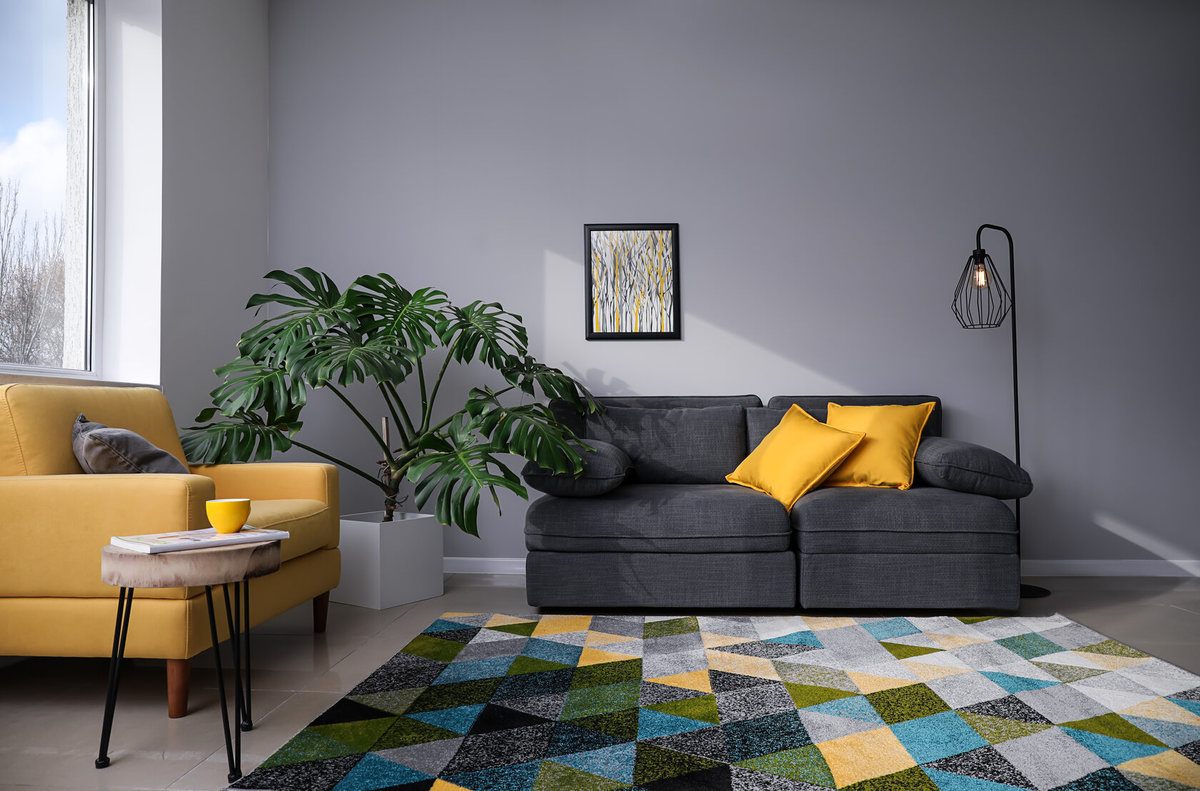
Open Concept Living Room, Dining Room, and Kitchen
Many homes today have an open floor plan for the living room, dining room, and kitchen. This is most often done in modern and contemporary homes and is a good layout for families with young children because the parents can always have line-of-sight to their kids.
The cost to open it up depends on the number of walls you have in the space. Costs to remove a wall range from $1,200 to $5,000, depending on whether they are load-bearing. When opening up your space, you may need to reroute plumbing, electricity, and sometimes heating vents. This can make the project difficult and costly.
Enhancement and Improvement Costs
Smart Living Room
A great addition to a modern home is to make your living room smart. Smart living rooms include several features, such as hubs, smart lights and speakers, coffee tables, and TVs. The costs for this range from $3,500 to $12,000 completely installed.
Cost to Raise a Sunken Living Room
Sunken living rooms were a popular addition to contemporary spaces decades ago. If your room is sunken, it can be raised to make it a single level. The cost is $5,000 to $25,000, depending on the construction method and flooring type.
Soundproofing a Living Room
If you use your living room as a theater, gaming room, or for entertaining, you may want to soundproof it. Soundproofing uses acoustic-absorbing materials on the walls and ceiling to improve the sound quality in the room. This has an average cost of $1,000 to $2,500.
Area Rug Cost
You can add an area rug over the flooring in your living room. This adds color and pattern to the room, softens the flooring, or helps protect it. Area rugs come in many shapes, sizes, colors, patterns, and materials. They have starting costs of around $75 and can cost as much as $2,000 for very detailed rugs.
Wine Cellar under a Living Room
If you collect wine, consider adding a wine cellar beneath your living room. Wine cellars make a great addition to many homes and can be installed in several ways. The most common system beneath a living room is an active system, which means adding climate control. The total cost range for building a wine cellar is $15,000 to $60,000 due to the many variables involved.
Additional Considerations and Costs
- Depth of project. Living room remodels can be simple or elaborate. The more involved and elaborate the project becomes, the more costly it is.
- Ceiling. White, light, and bright-colored ceilings work best in small living rooms to prevent the room from feeling closed-in. This can also make the room look taller.
- Focal points. Add a chandelier or fireplace as a focal point in the room to catch the eye and make it feel larger.
- Art additions. You can add art in many ways, including gallery walls, which create a focal point and add interest.
- Permit. You may need to pull a permit for living room remodels. Speak to your contractor for more information.
- Get at least three quotes. Always get at least three quotes for any project. This helps find the right contractor for the job and better understand what you are getting for your money.
FAQs
- How much does it cost to remodel a living room?
The cost to remodel an average-sized living room is around $8,000, but the total range is $2,500 to $15,000, depending on what you do.
- What are the new colors for living rooms?
There are many popular colors for living rooms today, including deep purple, gray, taupe, yellow, white, and most shades of blue.
- How can I make my living room look bigger?
You can make your room look larger by using light cool colors on the walls. Include many reflective surfaces, such as mirrors, and ensure you have lots of light. Keep your furnishings minimal and avoid using competing patterns.
- What is a transitional living room?
A transitional style bridges two styles. For example, rustic modern bridges rustic designs and contemporary styles. A transitional living room includes elements of two styles and blends them.
- How do you arrange furniture in a walkthrough living room?
First, map out the most common route through the room and avoid putting furniture in this path. Next, create gathering places or conversation areas. Do not be afraid to use the walls, corners, or room center, provided you stay out of the most common path.
- How can I renovate my living room for cheap?
Work on surfaces that are already there rather than replacing them. Paint your walls and ceiling, refinish your existing flooring, and consider slipcovers on furniture.
- How do you brighten up a small living room?
Use cool light colors in the space. Include many reflective surfaces, such as mirrors, and make sure you let in as much natural light as possible. Add additional light sources if the space does not get much natural light.
Remodeling Terms Cheat Sheet
Definitions in laymen's terms, cost considerations, pictures and things you need to know.See full cheat sheet.
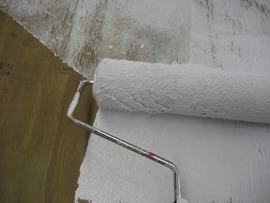 1 Primer: Preparatory coat applied to materials (drywall, wood, metal, etc.) before painting to ensure paint adhesion, extend paint durability, and help seal and protect the surface to be painted
1 Primer: Preparatory coat applied to materials (drywall, wood, metal, etc.) before painting to ensure paint adhesion, extend paint durability, and help seal and protect the surface to be painted
 3 Mortar: A mixture of Portland cement or lime or a combination of both, sand, and water used to bind bricks, stones, and concrete masonry units together
3 Mortar: A mixture of Portland cement or lime or a combination of both, sand, and water used to bind bricks, stones, and concrete masonry units together
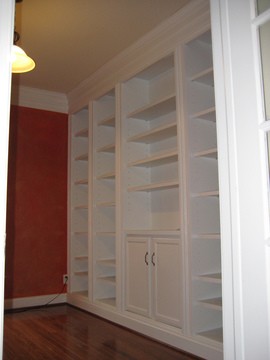 4 Built-in: An item of furniture, such as a bookcase or set of cabinets, that is built directly into the structure of the room. Built-ins are therefore customized to the room and not detachable
4 Built-in: An item of furniture, such as a bookcase or set of cabinets, that is built directly into the structure of the room. Built-ins are therefore customized to the room and not detachable
 6 Crown molding: A decorative finish that adds interest to the area where the top of a window meets the wall, or lines the area where the wall meets the ceiling
6 Crown molding: A decorative finish that adds interest to the area where the top of a window meets the wall, or lines the area where the wall meets the ceiling
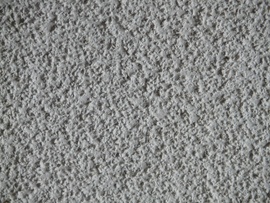 7 Popcorn ceiling: A spray-on or paint-on treatment for the upper interior surface of a room which has a rough curd-like texture and is used to hide imperfections, absorb sound, and reduce echoes
7 Popcorn ceiling: A spray-on or paint-on treatment for the upper interior surface of a room which has a rough curd-like texture and is used to hide imperfections, absorb sound, and reduce echoes
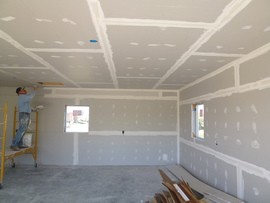 8 Drywall: Type of plasterboard, commonly used to build walls and ceilings, composed of gypsum that is layered between sheets of heavy paper
8 Drywall: Type of plasterboard, commonly used to build walls and ceilings, composed of gypsum that is layered between sheets of heavy paper
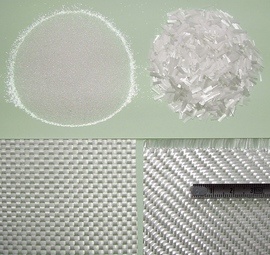 9 Fiberglass: Plastic that is reinforced with glass fibers. The fibers may be mixed randomly throughout the plastic, or come in the form of a flat sheet, or be woven into a fabric
9 Fiberglass: Plastic that is reinforced with glass fibers. The fibers may be mixed randomly throughout the plastic, or come in the form of a flat sheet, or be woven into a fabric
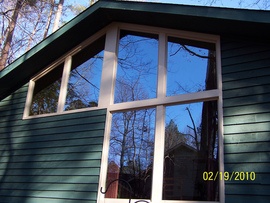 11 Picture window: An opening in the wall consisting of one large pane of glass that does not open
11 Picture window: An opening in the wall consisting of one large pane of glass that does not open
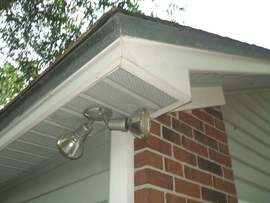 12 Roofline: Construction material, typically composed of vinyl or aluminum, used to enclose the underside of eaves and ceilings
12 Roofline: Construction material, typically composed of vinyl or aluminum, used to enclose the underside of eaves and ceilings
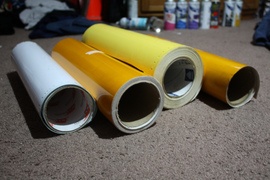 14 Vinyl: A synthetic plastic made from ethylene and chlorine. Vinyl has many applications in the construction industry and it is widely used in sidings, window frames, roofing and gutters, among others
14 Vinyl: A synthetic plastic made from ethylene and chlorine. Vinyl has many applications in the construction industry and it is widely used in sidings, window frames, roofing and gutters, among others
How much does it cost to remodel a living room in my city?
Cost to remodel a living room varies greatly by region (and even by zip code). To get free estimates from local contractors, please indicate yours.

